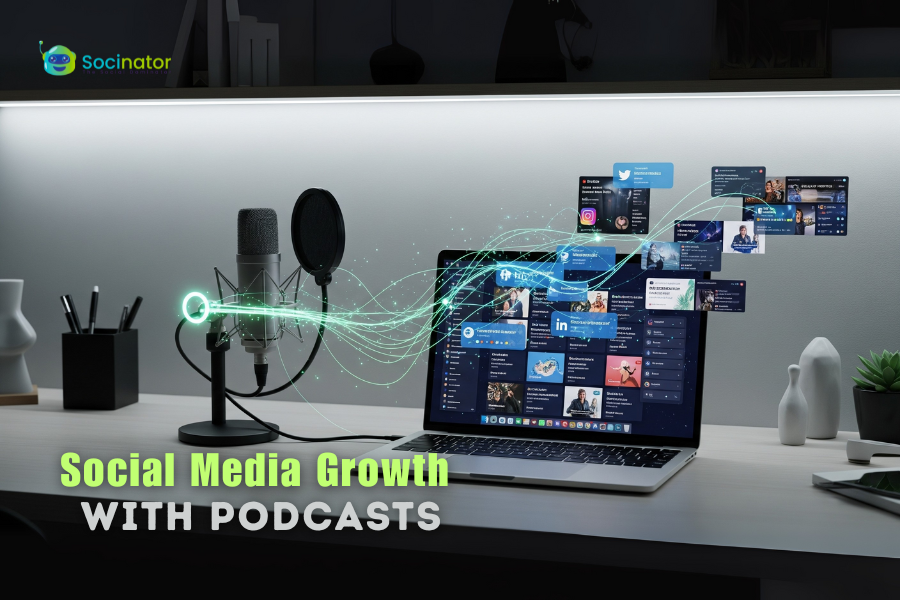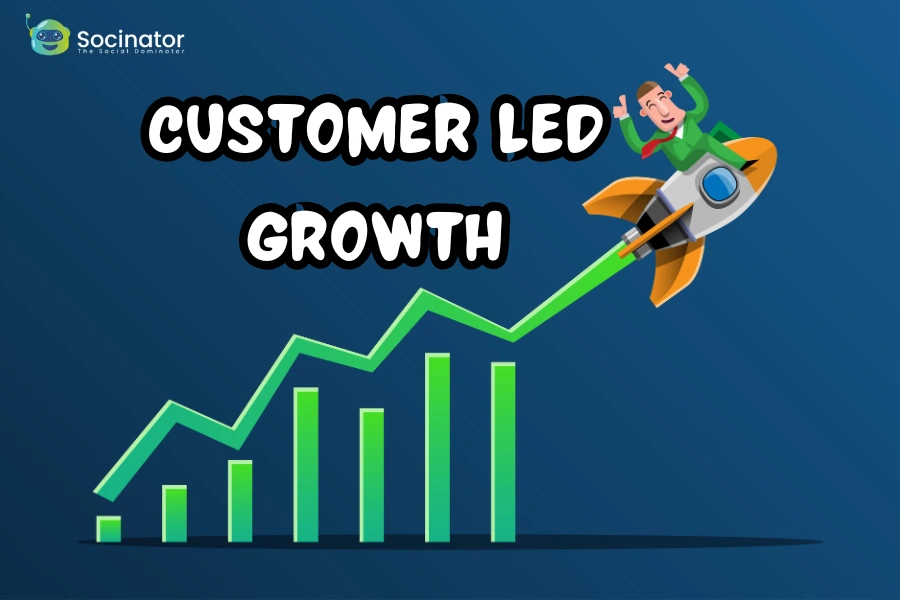Social media marketing for B2B, or business-to-business, has emerged as a pivotal strategy in the digital landscape. In today’s interconnected world, leveraging social platforms isn’t just for B2C companies. B2B enterprises can significantly benefit from a well-crafted social media strategy tailored to their specific audience and objectives.
Unlike B2C, B2B marketing on social media often requires a more nuanced approach, focusing on building professional relationships, providing valuable industry insights, and showcasing expertise. From LinkedIn to Twitter, platforms offer diverse opportunities to connect with decision-makers, engage with industry peers, and amplify brand presence.
In this blog series, we’ll delve into the nuances of B2B social media marketing, explore effective strategies, and offer practical tips to harness its potential for business growth and success. So, let’s get started with the basics.
Hit ‘Play’ Button & Tune Into The Blog!
What Is Social Media Marketing For B2B?
Business-to-business social media marketing involves utilizing social media platforms to establish connections, nurture relationships, and advertise products or services to other businesses.
But let’s clarify one thing: B2B doesn’t equate to dull. Quite the opposite is true. Social media offers an opportunity to shift away from mundane marketing approaches towards more innovative and engaging strategies.
In contrast to B2C marketing, which often prioritizes quick sales from individual consumers, B2B marketing emphasizes building enduring relationships and showcasing expertise in industry-specific challenges.
Through social media, B2B enterprises can craft messages that resonate, evoke emotions, and cultivate deeper connections with their audience. This positions their brand as a relatable resource that potential clients find compelling and return to.
Managing multiple platforms and engaging in various conversations might seem daunting. However, with a well-structured plan, and B2B marketing automation software you can spark discussions that transcend mere one-way communication and evolve into meaningful exchanges with your audience.
Why Is Social Media Marketing For B2B Crucial?
In the ever-evolving realm of business-to-business (B2B) marketing, the role of social media stands as a cornerstone. As we venture into the years, the relevance of social media within B2B strategies isn’t just notable; it’s indispensable for achieving success. Below, we delve into the reasons why B2B social media marketing holds paramount importance and how it can revolutionize your business:
Establishes Brand Authority and Trustworthiness:
Platforms like LinkedIn and Twitter serve as vital arenas for showcasing industry expertise. Authentic engagement with audiences fosters credibility and trust among potential clients and industry peers.
Cultivates Relationships and Generating Leads:
Social media marketing for B2B transcends broadcasting messages, offering dynamic channels for continuous engagement throughout the buyer’s journey. Providing valuable content, active participation in discussions, and prompt responses nurture leads and convert them into loyal customers.
Spotlights Product or Service Innovations:
Visual platforms such as Instagram and YouTube provide captivating avenues to showcase offerings. Behind-the-scenes glimpses, success stories, and case studies illustrate the tangible impact of solutions, driving interest and engagement.
Additionally, social media serves as a vital source of real-time industry insights, allowing businesses to stay informed about emerging trends and market shifts. Harnessing paid advertising further enhances targeted outreach, maximizing campaign impact by reaching the right decision-makers. These interconnected trends underscore the indispensable role of B2B social media marketing in shaping business strategies for success.
How To Implement Advanced Social Media Marketing For B2B?
Implementing advanced marketing for B2B involves several strategies tailored to the unique characteristics and needs of businesses selling to other businesses. Here’s a comprehensive guide to help you get started:
Establish SMART Goals:
Specific: Clearly define what you want to achieve with your social media efforts. For example, instead of a vague goal like “increase brand awareness,” specify that you want to increase brand mentions by 20% in the next quarter.
Measurable: Determine how you will measure progress towards your goals. This could include metrics like follower growth, engagement rate, website traffic from social media, or leads generated.
Achievable: Ensure that your goals are realistic and attainable given your resources and capabilities. Setting unrealistic goals can lead to frustration and demotivation.
Relevant: Align your social media goals with your overall business objectives. Ask yourself how achieving these goals will contribute to the success of your business.
Time-bound: Set a deadline for achieving your goals. This creates a sense of urgency and helps you stay focused on taking action.
Monitor Competitors:
Monitoring competitors is one of the best social media marketing for B2B strategy. Regularly monitor your competitors’ social media accounts. This activity helps you to stay informed about their activities, content strategies, and engagement tactics.
Analyze what seems to be working well for your competitors and consider how you can adapt or improve upon those strategies for your brand. While it’s important to be aware of your competitors, focus on highlighting your unique value proposition and offering a distinctive brand experience for your audience.
Share Original Content:
Create original content, as it allows you to showcase your brand’s personality, values, and expertise in B2B content marketing. This helps strengthen brand identity and fosters deeper connections with your audience. Offer content that educates, entertains, or inspires your audience. Focus on addressing their needs, challenges, and interests to keep them engaged and coming back for more.
Original content has the potential to spark conversations, drive shares, and increase interactions with your audience, ultimately leading to greater brand visibility and loyalty and ultimately aids in social media marketing for b2b.
Utilize Multimedia:
Multimedia content tends to stand out more in crowded social media feeds and captures attention more effectively than text-only posts. Visual and interactive formats allow you to tell richer, more immersive stories about your brand, products, or services.
Embrace new features and formats offered by social media platforms to experiment with different types of multimedia content and discover what resonates best with your audience.
Maintain Consistency:
Consistent posting establishes trust and reliability with your audience. It signals that your brand is active, engaged, and committed to providing value over the long term. Regular posting ensures that your content appears consistently in your audience’s feeds, maximizing your brand’s visibility and reach, ultimately benefiting social media marketing for B2B.
Use social media automation software like Socinator, and content calendars to plan and organize your social media content in advance. This b2b social media marketing strategy allows you to maintain a consistent posting schedule without feeling overwhelmed by day-to-day tasks.
Advanced Social Media Marketing And Automation Tool- Socinator
 Socinator is a social media management and automation tool designed to streamline and enhance your social media marketing efforts across various platforms. It offers a range of features to help businesses and marketers manage multiple social media accounts, schedule posts, engage with audiences, and analyze performance. Here’s an overview of its key features:
Socinator is a social media management and automation tool designed to streamline and enhance your social media marketing efforts across various platforms. It offers a range of features to help businesses and marketers manage multiple social media accounts, schedule posts, engage with audiences, and analyze performance. Here’s an overview of its key features:
Multi-Account Management:
Socinator allows users to manage multiple social media accounts from a single dashboard. This feature is particularly useful for businesses or individuals managing accounts across different platforms.
Post Scheduling
Users can schedule posts to be published at optimal times for maximum visibility and engagement. This helps social media marketing for B2B as it saves time and ensures a consistent posting schedule.
Engagement Automation
Socinator offers automation features for engaging with followers, such as likes, comments, and follow-unfollow users. These actions can be automated based on specific criteria and settings defined by the user.
Audience Targeting
Socinator allows users to target specific audiences based on demographics, interests, and behavior. This helps ensure that content reaches the right people and drives meaningful interactions.
Campaign Management
This social media automation tool helps users create and manage social media marketing campaigns directly within the platform. This includes setting campaign goals, defining targeting criteria, scheduling posts, and tracking results.
Socinator is a comprehensive social media management tool that offers a wide range of features to streamline and optimize your social media marketing for B2B efforts. Whether you’re a small business, a digital marketer, or a social media marketer, Socinator can help you save time, increase efficiency, and drive better results on social media platforms.
Read More
The Ultimate B2B Marketing Strategy And Procedure
11 Best Marketing Ideas To Skyrocket Your Social Media Marketing Campaigns
Best B2b Marketing Automation Software For Small Business
B2B Social Media Marketing Examples & Case Studies
Social media has emerged as a potent tool for fostering connections between businesses, establishing brand authority, and driving conversions. Let’s explore compelling instances and case studies that highlight how B2B companies from diverse sectors are tapping into the potential of social media marketing. These can also work as examples and ideas for your social media marketing campaigns.
LinkedIn’s Impact on Professional Networking
LinkedIn has evolved into the primary platform for social media marketing for B2B networking and lead generation. Tech giant Microsoft effectively utilized LinkedIn by crafting engaging content and leveraging targeted advertising. The outcome? A substantial increase in brand visibility thought leadership, and meaningful business connections.
Twitter’s Role in Real-Time Engagement for Tech Enterprises
For technology-focused B2B firms such as Cisco, Twitter has proven invaluable. Through active participation in pertinent industry discussions, sharing timely updates, and embracing Twitter’s hashtag culture, Cisco bolstered its brand presence, fostered community engagement, and showcased expertise within the dynamic tech sector.
Instagram’s Narrative-driven Approach for Fashion and E-commerce
Even within B2B sectors with a strong visual component, such as fashion manufacturing, Instagram has demonstrated its effectiveness. Companies like Stitch Fix have perfected the art of storytelling on Instagram’s visually-driven platform, sharing behind-the-scenes content, customer testimonials, and product showcases to craft a visually captivating brand narrative.
The Bottom Line
Social media marketing for B2B has become an indispensable way for companies across industries. From LinkedIn’s professional networking prowess to Twitter’s real-time engagement and Instagram’s narrative-driven approach, the examples and case studies showcased demonstrate the diverse ways businesses can leverage social platforms to build brand authority, foster connections, and drive conversions.
As the digital landscape continues to evolve, embracing innovative social media strategies will be essential for B2B enterprises to stay competitive, engage their target audience effectively, and achieve their business objectives in the dynamic world of online marketing.








